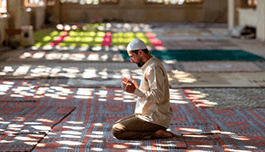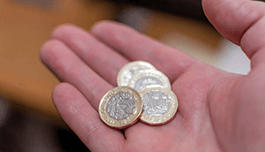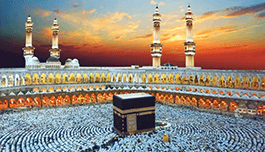The phrase “La hawla wala quwwata illa billah – لَا حَوْلَ وَلَا قُوَّةَ إِلَّا بِٱللَّٰهِ” (There is no might or power except by Allah) is known as “al-Hawqalah.” It is one of the most significant and important forms of dhikr, beloved by Allah the Most High, and it enhances the believer’s connection with his Lord.
Numerous hadiths in the Sunnah of the Prophet (ﷺ) encourage Muslims to consistently recite these words. The abundance of these texts highlights the great virtue and esteemed status of this phrase.
Some of the virtues of saying these powerful words are listed below.
1. A Treasure from the Treasures of Paradise
Abu Hurairah said: “The Messenger of Allah (ﷺ) said to me: “Be frequent in saying: “There is no might or power except by Allah, (La hawla wala quwwata illa billah).” For indeed, it is a treasure from the treasures of Paradise.’”
(Narrated by al-Tirmidhi (3601) under the chapter, “The Virtue Of: “There Is No Might Or Power Except By Allah”, Ahmad (2/333) and Al-Bazzar (8553). Classed as Sahih by Al-Albani in Sahih Al-Targheeb (1580)).
It was narrated that Hazim ibn Harmalah said: “I passed by the Prophet (ﷺ) and he said to me: “O Hazim, say often: ‘La hawla wa la quwwata illa billah,’ for it is one of the treasures of Paradise.'” (Narrated by Ibn Majah (3826) and Al-Tabarani in “Al-Kabir” (3565) with a weak isnad).
Abu Musa Al-Ash’ari said: “The Prophet (ﷺ) heard me saying: ‘La hawla wa la quwwata illa billah.’ He then said to me: “O ‘Abdullah bin Qais! Shall I not tell you of a word which is one of the treasures of Paradise?’ I said: ‘Yes, O Messenger of Allah.’ He said: ‘Say: ‘La hawla wa la quwwata illa billah’.'” (Narrated by Al-Bukhari (6384), Muslim (2704), Al-Nasa’i in “Al-Sunan Al-Kubra” (7679), Ibn Majah (3824) and Ahmad (19745)).
It was narrated that Abu Dharr said: “The Messenger of Allah (ﷺ) said to me: “Shall I not tell you of a treasure which is one of the treasures of Paradise?’ I said: ‘Yes, O Messenger of Allah.’ He said: ‘La hawla wa la quwwata illa billah.'” (Narrated by al-Nasa’i in “Al-Sunan al-Kubra” (11303), Ibn Majah (3825) and Ahmad (21346). Classed as Sahih by Shuaib Al-Arnaout in “Al-Musnad” (21346)).
Abu Dharr said: “My close friend (peace and blessings be upon him) commanded me with seven things: He commanded me to love the poor and to be close to them; to look at those who are below me and not look at those who are above me; to maintain the ties of kinship even if they turn away from me; to not ask anyone for anything; to speak the truth even if it is bitter; to not fear the blame of anyone when it comes to Allah; and to frequently say, ‘There is no power nor strength except with Allah,’ for these words are a treasure from beneath the Throne.” (Narrated by Ahmad (21415), Al-Harith in “Al-Musnad”(467) and Ibn Hibban (449). Classed as Sahih by Ahmad Shaker in Umdat Al-Tafsir (1/700)).
These words are a delightful treasure, demonstrating their immense value. Just as a treasure is safeguarded for its preciousness and worth, so too is the Hawqalah a treasure that Allah the Almighty reserves for its reciter, granting them the most precious and valuable rewards in Paradise.
2. Planting Trees in Jannah
Abu Ayyub al-Ansari reported that when the Messenger of Allah (ﷺ) was taken on the Night Journey, he passed by Prophet Ibrahim (peace be upon him). Ibrahim asked, “Who is with you, O Jibril?” He replied, “This is Muhammad.” Ibrahim then said, “O Muhammad, instruct your Ummah to increase in planting the trees of Paradise, for its soil is good and its land is spacious.” The Prophet (ﷺ) asked, “What are the trees of Paradise?” He replied, “There is no power nor strength except with Allah.”
(Narrated by Ahmad (23552), Ibn Hibban (821), Al-Tabarani in “Al-Mu’jam Al-Kabir” (3898) and Al-Bayhaqi in “Shu’ab Al-Iman” (657). It was classed as hasan by Ibn Hajar Al-Asqalani in “Nataij al-Afkar” (1/103)).
The Arabic word “غراس” (ghiras) refers to “plants” or “tree saplings.” It specifically denotes young plants or trees that have been planted.
3. One of the Gates to Jannah
Qais bin Sa`d bin `Ubadah narrated that his father offered him to the Prophet (ﷺ) to serve him. He said: “The Prophet (ﷺ) passed by me, and I had just performed Salat, so he poked me with his foot and said: “Should I not direct you to a gate from the gates of Paradise?” I said: “Of course.” He (ﷺ) said: “There is no might or power except with Allah.””
(Narrated by Al-Tirmidhi (3581), Al-Nasa’i in (Al-Sunan Al-Kubra) (10187), Ahmad (15480), Al-Hakim (4/290), Al-Bayhaqi in Shu’ab Al-Iman (660), and Al-Bazzar (3085). It was authenticated by Al-Suyuti in Al-Jami’ Al-Saghir (2857) and Al-Albani in Sahih Al-Jami’ (2610)).
This hadith has a witness in the hadith of Mu’adh bin Jabal in which The Prophet (ﷺ) asked him: “Shall I not direct you to one of the gates of Paradise?” He was asked: “What is it?” He replied: “There is no might or power except with Allah.”
(Narrated by Al-Nasa’i in “Al-Sunan Al-Kubra” (10189), and Ahmad (21996). Shuaib Al-Arnaout said in Al-Musnad (22099): Hasan li-ghayrihi (good according to collaborating reports)).
4. An Enduring Good Deed
Allah says in the Quran:
“But the enduring good deeds are better to your Lord for reward and better for one’s hope.” (Qur’an, 18:6)
The Messenger of Allah (ﷺ) informed us that al-Hawqalah is one of these enduring good deeds that will remain forever and whose reward will never get lost.
Abu Saeed Al-Khudri reported that The Messenger of Allah (ﷺ) said, “Increase in the ‘enduring good deeds’ (الباقيات الصالحات) so they asked: “What are they, O Messenger of Allah?” He replied: “The enduring good deeds are saying Allahu Akbar, Subhan’Allah, Alhamdolilah, La ilaha illa Allah and La hawla wa la quwwata illa billah.” (Narrated by Ahmad (11731), Abu Ya’la (1384), Al-Tabari (18/34), Al-Hakim (1/512) and Ibn Hibban (840). Al-Haythami said in “Majma’ al-Zawa’id” (10/87): “Narrated by Ahmad and Abu Ya’la. . . Their chain of transmission is good.”)
‘Uthman ibn ‘Affan, Ibn ‘Umar and Sa’id ibn al-Mussayyab were asked about the ‘enduring good deeds’ and they said that they are Subhan’Allah, Alhamdulillah, Allahu Akbar, La ilaha illa Allah and La Hawla wa la Quwwata illa Billah. (Narrated by Ahmad (1/71) and al-Tabari in his Tafsir (15/254-256)).
5. A Statement of Goodness And Reward
The Messenger of Allah (ﷺ) used to frequently teach these words to the people.
‘Abdullah Ibn Abi Awfa reported that a man came to the Prophet (ﷺ) and said: ‘I can’t memorise anything from the Qur’an: so teach me something which is sufficient for me.’ He said: ‘Say ‘Glory be to Allah’, ‘Praise be to Allah’, ‘There is no god but Allah’, ‘Allah is the greatest’, and ‘There is no might and no strength but in Allah.’ The man said: ‘O Messenger of Allah, this is for Allah, but what is for me?’ The Prophet (ﷺ) told him: ‘Say: ‘O Allah have mercy on me, and sustain me, and keep me well, and guide me.’ When the man left, The Messenger of Allah (ﷺ) said: ‘He filed up his hand with goodness!'” (Narrated by Abu Dawud (832), Al-Nasa’i (924) and Ahmad (19161). Classed as Hasan by Ibn Hajar al-Asqalani in “Hidayat al-Ruwat” (1/392)).
Just as the Messenger of Allah (ﷺ) encouraged the believers to frequently say Al-Hawqalah, the companions, may Allah be pleased with them, also encouraged one another to utter this phrase regularly.
‘Amir ibn Sa’d said: “I met Abu Ayyub al-Ansari and he said to me: ‘Shall I not command you to what the Messenger of Allah (ﷺ) commanded me to? It is to frequently say: “There is no power nor strength except with Allah,” for it is one of the treasures of Paradise.'” (Narrated by Ibn Abi Shaybah (36410), Al-Tabarani in “Al-Kabir” (4/158), Abd ibn Humaid (231) and Abu Ya’la. It was classed as Hasan (good) by Ibn Hajar al-Asqalani in “al-Matalib al-‘Aliya” (4/43)).
6. A Means for Forgiveness of Sins
Abdullah ibn ‘Amr narrated: The Messenger of Allah (ﷺ) said: “No one on earth says: ‘None has the right to be worshipped but Allah, and Allah is the Greatest, and there is no might nor power except by Allah (Lā ilāha illallāh, wa Allāhu akbar, wa lā ḥawla wa lā quwwata illā billāh), except that his sins shall be pardoned, even if they were like the foam of the sea.” (Narrated by Al-Tirmidhi (3460), Ahmad (6479), Al-Nasa’i (10658), Al-Bayhaqi in “Al-Dawa’at” (121) and Al-Hakim (1/503). Classed as Hasan by Al-Tirmidhi and Al-Albani in Sahih al-Jami’ (5636)).
7. Allah Affirms the Truth of These Words
The Messenger of Allah (ﷺ) said: “If a person says, ‘La illaha illallah, la hawla wa la quwwata illa billah (There is none worthy of worship and there is no power and no strength except with Allah)’ his Lord will affirm the truth of what he says and respond: ‘My servant has spoken the truth; there is no god but Me, and there is no power nor strength except through Me.'” (Narrated by Al-Tirmidhi (3430), Ibn Majah (3794), Ibn Hibban (851), Al-Hakim (1/46), Al-Nasa’i in “Al-Kubra” (9858), and Al-Bayhaqi in “Al-Shu’ab” (1/No. 663). Classed as Sahih by Al-Albani in Sahih Al-Jami’ (713)).
8. A Declaration of Submission to Allah
Abu Hurairah: And the Prophet ﷺ said: “Should I not guide you to a word from below the Throne, that is from the treasures of Paradise? It is to say: ‘La Hawla wa la Quwwata illa Billah’. Allah will say, ‘My slave has submitted and surrendered himself.’” (Narrated by al-Hakim 54; authenticated by Al-Hakim and Al-Dhahabi).
In another report: “If a person says La Hawla wa la Quwwata illa Billah, Allah says, “He has submitted and surrendered.” (Narrated by Al-Hakim, and Ibn Hajr said its chain is strong. Fath al-Bari, 11/501).
Al-Nawawi said: “It is a word of surrender and delegation, meaning that the slave does not own anything of his own affair, and he has no means to repel evil, nor the power to bring good; except by the will of Allah Almighty.”
The Meaning of Al-Hawqalah
1. Dependence on Allah: The phrase “There is no power nor strength except with God” signifies that there is no change from one state to another, and no ability for the servant to accomplish anything without Allah’s help, success and guidance.
2. Repelling Evil and Achieving Good: It means that there is no power to repel evil and no ability to achieve good except through Allah.
3. Acknowledgment of Need: It is an acknowledgment of your poverty and need for your Lord in all circumstances, fulfilling the Almighty’s saying: “O people, you are in need of Allah, and Allah is the Rich, the Praiseworthy.” (Qur’an, 35:15)
Conclusion
In summary, the words “La hawla wala quwwata illa billah” hold profound significance, representing a deep acknowledgment of our reliance on Allah for all things. They are a treasure from the treasures of Paradise, a key to Jannah, a means of repelling evil and achieving good, removing sins and planting trees in Jannah.
Despite their immense virtue and importance, these words are easy to learn and say. By incorporating this powerful dhikr into our daily lives, we can strengthen our connection with Allah and continually remind ourselves of our need for His guidance and support.
Let us make it a habit to say these words more often and reap the countless benefits they offer. You can start by saying it 10 times a day, gradually building up to 100 times or more daily.
Allah is the ultimate source of success!






